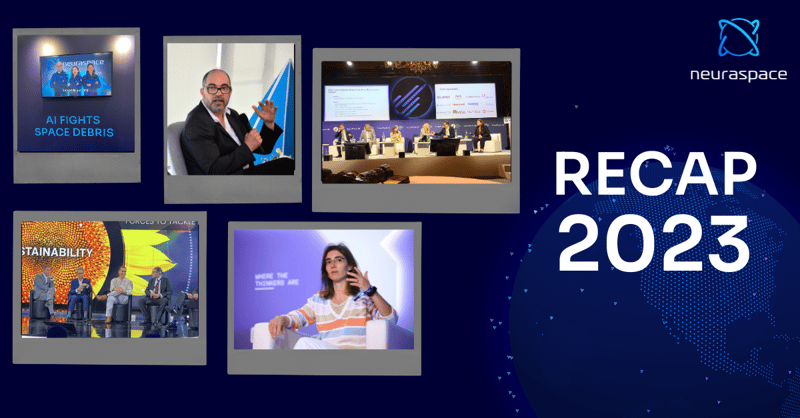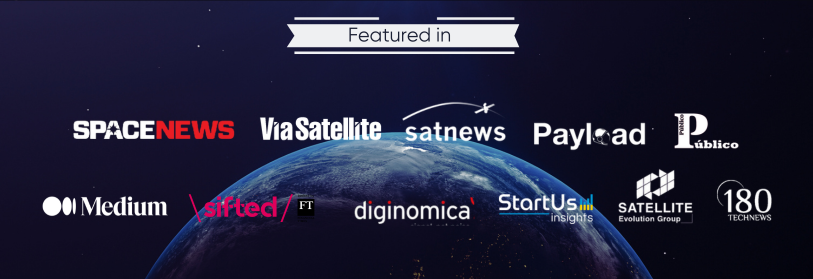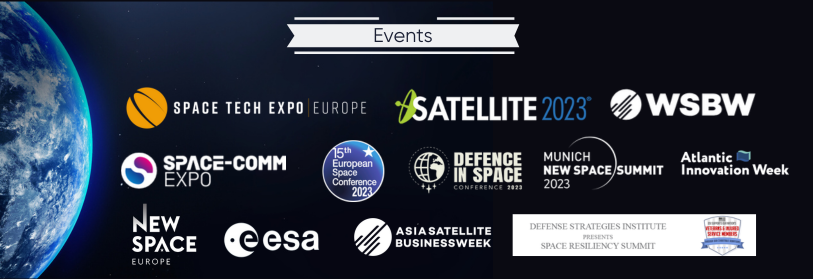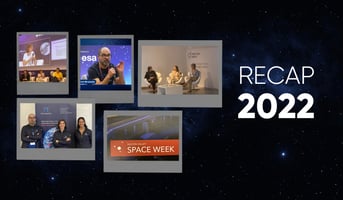Neuraspace Recap 2023

2023 has been a year of massive growth and progress. Read on to know about our journey this year including recognitions, major platform updates, our collaborations and partnerships, and more.
Reflecting back when we started and the subsequent launch of our platform globally, in July 2022 - we have made additions and enhancements to it as well, as per the market feedback. The platform now solely ensures that it solves the challenges of the satellite operators in Space Traffic Management.

Some of the significant company highlights:
- Our platform currently monitors nearly 300 satellites, serving as an essential tool for some of the major satellite operators in the market.
- Dragonfly Aerospace selected Neuraspace for enhanced space sustainability through smarter space traffic management. Read more
- Neuraspace widens its data fusion scope by incorporating data from one of Elecnor Deimos’ telescopes for achieving better accuracy and tracking. Read more
- Neuraspace partnered with Arcsec to harness the exceptional precision of Arcsec’s space-based star trackers for the detection and characterisation of space debris and resident space objects. Read more
- We experienced a growth rate of 40% this year in team size and can proudly say that we are gender inclusive, with more than 34% females in prominent positions. Our talent base possesses a diverse skill set and spans globally, representing eight nationalities.
- Seven research papers were published this year, expanding the scope of thought leadership, reflecting our commitment to advancing knowledge, and offering valuable insights.
The Neuraspace Platform
The platform ensures collision-free and coordinated space traffic, allowing spacecraft to operate autonomously, optimise resources, and prioritise their own safety and security. We launched the web-based platform in July 2022. Since then, we have gained a deeper understanding and accumulated market feedback that has shaped the platform in a manner that it solves the current challenges of the satellite operators.
Here's what our platform offers:
➡️Collision avoidance manoeuvre and operations manoeuvres planning
The platform allows manoeuvre screening to validate the planned manoeuvres, ensuring they do not result in a close encounter. Additionally, stay informed about the movements of other resident space objects for even precise manoeuvres.
- Get an overview of asset status and collision warnings;
- Receive collision avoidance manoeuvres recommendations.
- Check the orbital changes and its impact on the detected conjunctions and suggested manoeuvres.
- Types of manoeuvres suggested: impulsive, constant thrust, drag manoeuvres.
➡️Better informed decisions with data fusion approach
Large quantities of data are collected and analysed, including but not limited to ephemeris files, space weather data, CDMs, space debris data, and resident space objects’ positions. These offer better risk assessment and lower the rate of false positives/negatives, thereby allowing for taking action only when needed.
➡️Conjunction prediction, classification and notifications
- Forecast the uncertainty over the position of the objects involved in a conjunction at the time of closest approach (TCA) via the Machine Learning models.
- Gain additional understanding of close encounters with the 3D visuals and receive timely notifications based on custom pre-scheduled thresholds for warning settings depending on the risk tolerance.
- Receive risk alert warnings notifications on email and Microsoft Teams, only for high-risk events while maintaining a complete overview of all potential conjunctions.
- Gain in-depth insight into all potential conjunctions associated with assets.
.png?width=1920&height=1080&name=Milestones%20(1).png)
In the Journal
- Taxonomy for Resident Space Objects in LEO: A Deep Learning Approach. Read more.
- Probability of Collision of satellites and space debris for short-term encounters: Rederivation and fast-to-compute upper and lower bounds. Read more
- AI for Space Traffic Management. Read More
- Statistical Learning of Conjunction Data Messages Through a Bayesian Non-Homogeneous Poisson Process. Read more
- Predicting the Position Uncertainty at the Time of Closest Approach with Diffusion Models. Read more
- Predicting the Probability of Collision of a Satellite with Space Debris: A Bayesian Machine Learning Approach. Read more.
- Finding Real-World Orbital Motion Laws from Data. Read more.
Membership/ Community
ESA Zero Debris Charter - Neuraspace is one of the early supporters and signatory to the charter. We are committed to supporting the objectives of the Zero Debris Charter and a "Zero Debris Future'' by developing and implementing innovative technologies and strategies to minimise the unintentional generation of space debris. This we intend to do by contributing to the achievement of the targets, especially via our products that help and support satellite operators with collision avoidance.
Space Sustainability Ratings (SSR) - Being a part of SSR, Neuraspace plays an active role in pushing forward policies and strategies for space sustainability.
IAF Astro - Belonging to this community, we are a part of promoting space activities, developing new technologies, and promoting awareness to government and societies, to better involve them and illustrate the benefits that might come from the utilisation of space.
Recognitions
We have been recognised by several eminent bodies including the space community and the VC community and here are some of them that puts us in the STM leadership radar:
- Most Interesting Startups from Portugal to Watch: Vestbee
- Neuraspace makes it amongst the 5 Innovative Solutions in the Space Industry: Novable
- 9 Launch System Trends in 2023: Startus Insights
- 10 European Space Tech startups shaping life on earth: EU Startups
- 10 super promising Portugal-based startups to watch in 2023: EU Startups
- Mention as top Portuguese Minicorn: Tech 180 News
- 9 Portuguese startups to watch, according to VCs: Sifted
- Satellite and NewSpace companies in focus: Neuco
An outlook on 2024
“Neuraspace is committed to shaping the future of space and we continue to work towards it in 2024. Our vision is to lead Europe in space safety and sustainability via our deep domain knowledge and technology expertise in Artificial Intelligence and Machine Learning, computing, and sensor technologies. As a dedicated team of experts, we are poised for significant growth to be a market leader, with our dedication to innovation, sustainability, and a transformative impact on the space industry”, said Chiara Manfletti, CEO, Neuraspace.
"As we advance into 2024, AI based automation is proving indispensable for optimised space operations, leading to significant cost savings and enhanced sustainability. Next year, we're set to witness groundbreaking progress in AI applications, further solidifying its essential role in the future of space exploration and Neuraspace's position as a leader in this field", remarked Carlos Cerqueira, Head of Business Development, Neuraspace.
We thank everyone for their continued support, especially, Armilar Venture Partners, Portugal Space, The European Space Agency, our board, customers, partners and stakeholders, and our amazing team for always believing in the vision and relentlessly making efforts to accomplish it.



-2.png?height=200&name=Newsletter%20(4)-2.png)

